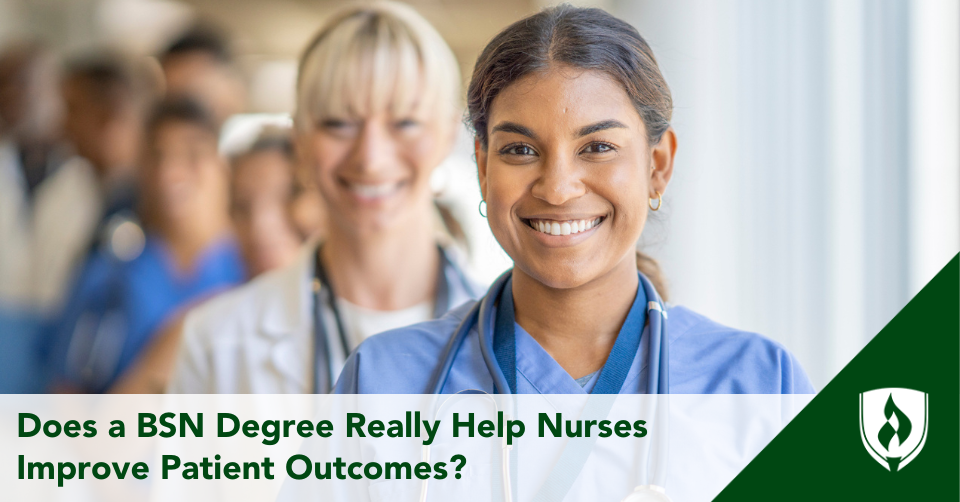
80 percent of the nursing workforce should have a Bachelor of Science in nursing (BSN) or higher by 2020, according to the Institute of Medicine. That statement from 2010 was prompted by growing evidence that demonstrated better patient outcomes in hospitals with higher percentages of nurses with a Bachelor of Science in Nursing (BSN).1
While this signpost goal did not come to fruition, many healthcare systems still aim to increase the number of BSN nurses in their ranks. And many nurses wonder if a bachelor’s degree would really make that much of a difference to their patients or their career prospects.
Does a BSN really improve patient outcomes? Some research has a pretty strong response.
Each 10-percentage-point increase in the hospital share of nurses with a BSN was associated with 24 percent greater odds of surviving to discharge with good cerebral performance among patients who experienced in-hospital cardiac arrest, according to research conducted by the National Library of Medicine.
A growing body of evidence suggests that hospitals see better outcomes for patients when they staff a higher percentage of BSN nurses. These findings encourage policies to increase access to bachelors-level nursing education and improve hospital nurse staffing.
As an associates-level nurse (ADN) with your registered nursing license (RN) or a licensed practical nurse (LPN), you’ve likely noticed this push. In fact, the hiring hospitals in your area may have already incentivized their nurses to hold a BSN or start working toward one.
You might be asking, what difference does having a BSN really make? The truth is, this degree can benefit more than just the hospitals. As the statistics above show, it can benefit patients too.
Who’s behind the push for BSN education?
It's clear that education has a measurable impact on the knowledge and competencies of nurse clinicians, as it does for all healthcare providers.2 This is something repeatedly acknowledged by the American Association of Colleges of Nursing (AACN), just one of the associations encouraging employers to offer incentives for registered nurses to pursue BSNs.
Nurse executives, federal agencies, the military, nursing organizations, healthcare foundations, Magnet hospitals and minority nurse advocacy groups are some of the other leading groups advocating for an increase of BSN nurses in clinical healthcare settings.
Let’s break down why exactly this is, and how achieving this education level can help both you and your patients going forward.
Here are 12 benefits of BSN prepared nurses in healthcare settings—and the reasons you may want to consider becoming one yourself.
Earning your BSN can…
1. Contribute to lower surgical mortality rates
Having a higher proportion of baccalaureate-prepared nurses in hospital settings—regardless of their educational pathway—is associated with lower rates of 30-day inpatient surgical mortality.3
This doesn’t just mean that getting a BSN can help you contribute to this positive trend, it means it’s never too late in your nursing career to pursue a BSN degree.
2. Increase on-the-job preparedness
BSN RNs reported being significantly better prepared than associate-degree nurses in 12 out of 16 areas related to quality and safety, according to the AANC.
These areas included evidence-based practice, data analysis and project implementation. The researchers’ conclusion? Improving organizational policies requiring BSN RNs could help safeguard the quality of patient care.3
3. Meet changing industry standards
The percentage of RNs with a BSN or higher degree in the U.S. workforce exceeded 70% for the first time in April 2023, according to results from the 2022 National Nursing Workforce Survey. Now, more than half (51%) of nurses first enter the workforce with a BSN or entry-level master’s degree.3
As of 2023, there are approximately 747 RN-to-BSN and 195 RN-to-MSN programs that build on associate degree and diploma programs, according to the AACN. Hundreds of individual agreements exist between community colleges and four-year schools, and state-wide articulation agreements exist in most states to help advance more RNs into BSN graduates. 3
In New York, this preference was signed into law. Andrew Cuomo signed the BSN in 10 law in 2017, requiring all New York nurses to receive a BSN in nursing within 10 years of becoming a nurse. Rhode Island, New Jersey and some other states are said to be considering similar bills.
4. Allow practice in more healthcare settings
The past decade has demonstrated a shift away from hospital-centered inpatient care, towards more primary and preventative care in outpatient settings. This trend is causing a demand for nurses with BSN degrees who can practice across various outpatient settings.
In addition to hospitals, BSN nurses can practice in home health services, community clinics, health maintenance organizations and across case management and leadership roles. They can also practice in areas related to critical care, public health and mental health.
Practice in Magnet hospitals
Many hospitals prefer hiring BSN nurses because it’s necessary for achieving Magnet status. Magnet status is a title given out by the American Nurses Credentialing Center for nursing excellence, innovations in nursing practice and superior patient outcomes.
Because of this, Magnet hospitals are considered model patient care facilities, and they typically employ a much higher proportion of BSN nurses compared to other hospitals. Every Magnet hospital in the U.S. requires all nurse managers and nurse leaders to hold either a BSN or graduate degree in nursing, regardless of the state’s specific laws.3
Practice in the U.S. military
The U.S. military also has requirements for nursing education. The U.S. Army, U.S. Navy and U.S. Air Force require that active-duty Registered Nurses to have their BSN. The same goes for commissioned officers within the U.S. Public Health Service.4
5. Broaden your knowledge base
Generally speaking, BSN programs encompass all of the material taught in professional nursing (ADN) and practical nursing (LPN) programs, plus a more in-depth treatment of the physical and social sciences, nursing research, public and community health, nursing management and the humanities.
The coursework also provides those in the nursing profession with a better understanding of the cultural, political, economic and social issues that affect patients and influence healthcare delivery.3
Plus, the expanded coursework of a four-year baccalaureate education typically offers more of a global perspective, including a curriculum that covers preparation in patient education, decision-making, community health and leadership.
6. Enhance your professional development
The knowledge gained through a baccalaureate degree plays a large part in a graduate’s professional development down the line. BSN program graduates are recognized for their skills in critical thinking, leadership, case management and health promotion, as well as the flexibility that comes from being able to practice across a broader range of settings.
A BSN can help nurses work towards obtaining nursing certifications in several specialties, including those that require a higher degree (like an MSN or DNP) since a BSN is typically an entrance requirement for those programs. can allow them to work in a wider range of leadership roles and medical specialty roles in areas like cardiology, women’s health, critical care and pediatric ICU.
7. Widen your scope of practice
With a wider educational foundation comes a wider scope of practice.
BSN programs prepare nursing students to accept and practice a broader range of responsibilities, including managing new health technologies, home healthcare decision-making, discernment for post-op and preventive care and coordinating comprehensive patient care plans.
8. Gain more workplace autonomy
BSN nurses tend to hold greater autonomy over critical decisions in patient care. This is particularly important when practicing in non-hospital settings where there may be fewer medical professionals to collaborate with.
With a BSN, nurses gain more independence in clinical decision-making, case management, bedside care, aide and support personnel supervision and patient guidance and education.
9. Strengthen workplace relationships
As primary care providers, RNs work as part of a medical team with colleagues educated at the graduate level. These professionals—from physicians to pharmacists and beyond—deal with complexities in patient care every day and recognize the need for higher education.
With nurses primarily responsible for direct patient care and care plan coordination, many healthcare workers believe that nurses should not be the least educated members of a medical team.2
Earning a BSN can help improve the team dynamic and foster workplace relationships built on trust.
10. Increase patient trust
A historic Harris Poll conducted in 1999 showed that an overwhelming percentage of the public—76%—believed that nurses should have four or more years of education past high school to perform their duties.3
Though it’s a long-cited statistic, the general sentiment remains true today. The more education and credentials you have, the more credibility you have—and that can only help increase patient trust in a clinical setting.
11. Enjoy higher employment rates
Studies show that a BSN offers opportunities for higher salaries and higher employment rates. Nurses with a bachelor's degree routinely make more annually than those with an associate degree, according to the 2020 National Nursing Workforce Survey. This can allow BSNs to worry less about finances and focus more on providing quality care.
In terms of employment, 94% of BSN graduates secured employment 4-6 months after finishing their programs, according to the AACN 2020 Annual Report. The same report showed that 82.4% of employers strongly prefer nurses with a BSN, and 41% of hospitals and healthcare facilities required candidates to hold a BSN. When it comes to putting your nursing education to work, earning a BSN may be a key factor.4
12. Prepare you for graduate school
Most graduate programs also require applicants to hold a BSN. Even nurses who’ve never considered graduate level education might someday feel the pull to really specialize in something as a nurse practitioner or rise up the ranks of hospital leadership.
A BSN lays that foundation if you might someday want to become a specialty-focused advanced practice registered nurse (APRN).
The bridge to a BSN program
It’s worth noting— there’s a nursing shortage right now. Every nurse is important, every healthcare worker a vital part of the system that saves lives against some really steep odds.
You know the incredible value of your work, and no matter how much an employer or region might push for BSN training, the odds are everyone around you knows it too.
But if you’re interested in some of these benefits BSN nurses can enjoy, you’ll be glad to know there are plenty of ways to earn a BSN without starting from scratch.
For example, Rasmussen University designed each nursing degree to easily build into the next. This way, LPNs can bridge into a professional nursing program to work toward their registered nursing license. And RNs can apply their existing experience toward a BSN program online.
A BSN online might sound a little unusual, but the arrangement might work well for nurses who plan to continue their jobs while they learn. Check out “ What to Expect from an RN to BSN Online Program” for some examples of how this type of program works.
Check out our articles, "Nursing Continuing Education: Why Does It Matter and What to Expect" and "5 Factors that Can Improve Patient Safety in Hospitals".
1Assessing Progress on the Institute of Medicine Report The Future of Nursing. [Accessed August 2023] https://www.ncbi.nlm.nih.gov/books/NBK350161/
2American Association of Colleges of Nursing, The Impact of Education on Nursing Practice [Accessed August 2023] https://www.aacnnursing.org/news-data/fact-sheets/impact-of-education-on-nursing-practice
3American Association of Colleges of Nursing, Fact Sheet: The Impact of Education on Nursing Practice [Accessed August 2023] https://www.aacnnursing.org/Portals/0/PDFs/Fact-Sheets/Education-Impact-Fact-Sheet.pdf
4Deering, Maura. How to Become a Military Nurse, Nurse Journal, [Accessed August 2023] https://nursejournal.org/careers/military-nurse/how-to-become/
5American Association of Colleges of Nursing, 2020 Annual Report [Accessed August 2023] https://www.aacnnursing.org/Portals/42/Publications/Annual-Reports/Annual-Report-2020.pdf




